After 20 years of being separated by migration, a difficult first embrace in New York City
Red de Pueblos Trasnacionales – or the Transnational Peoples Network – is an organization that brings together Indigenous and rural immigrants in the city, while facilitating family reunions
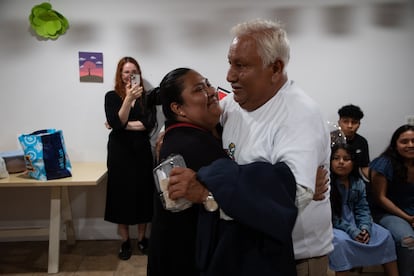

A voice stands out among all the voices in Terminal Four of John F. Kennedy International Airport. “Don Alonso!” someone shouts. Don Alonso looks around to see who’s calling his name. He raises his hand in approval, as if to say, “yes, that’s me.”
Don Alonso Escamilla left Mexico for the first time in his life and took his first plane ride. He will now see his daughter after 18 long years of waiting.
The Aeromexico flight lands on August 9, but Don Alonso has already been traveling for several hours. He left Tlapa — a mountainous municipality in the Mexican state of Guerrero — at 9 p.m. the night before to board the plane at two o’clock the next afternoon in Mexico City. For the occasion, he chose a plaid shirt, beige pants, leather shoes and a blue blazer, to add a bit of elegance to the outfit. He carries a red carry-on suitcase.
At JFK, when the immigration authorities ask him where he’s going, Don Alonso answers the obvious question with ease: “Well, to New York, where else?”
Once outside the terminal, Don Alonso — whose knees hurt from spending so much time sitting — gets into a car that enters the rainy New York night. Except in Times Square, nighttime in the Big Apple is as dark as anywhere else in the world. From the backseat, Don Alonso could easily be in Mexico. There’s nothing that allows him to confirm that he’s somewhere else… except for the certainty that, after a half-an-hour car ride, he will see his daughter, Edith Escamilla.
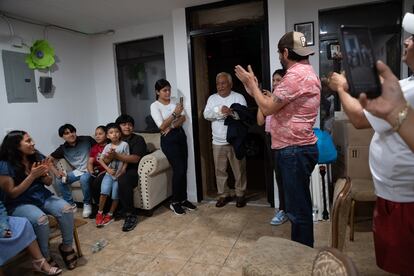
Don Alonso doesn’t seem excited. Rather, he’s even-tempered — maybe a little elusive. He barely speaks. If you ask him something, he’ll answer in a terse Spanish, always less comfortable than in his native Nahuatl. He’s serious. The only questions that seem to interest him are about the corn fields. “Right now, the cornfields are good,” he notes. “It’s rainy in Cahuatache [a town near Tlapa] and the cornfields are very good.”
The taxi finally stops. Those accompanying Don Alonso tell him that he has reached the end of the trip. “This here is called The Bronx,” they explain, to which Don Alonso answers: “Ah!”
The borough is familiar to him. In fact, the word “Bronx” has been heard in his house in the town of Cahuatache for many years, transmitted through letters, text messages and family video calls.
Inside a small shop, Edith is carrying a bouquet of flowers. She’s surrounded by her three daughters, her little granddaughter and her 11-year-old son, Alonso, who inherited his grandfather’s name (although he doesn’t know this).
Little Alonso is nervous. His hands are sweating, his cheeks are sweating and his jet-black hair is sweating: it slides down his forehead. Edith, however, is calm. When Don Alonso appears at the door of the shop, there’s no excitement, no surprise. Don Alonso calmly hugs Edith. He hugs his granddaughters one by one, bends down to kiss his great-granddaughter and meets his grandson, who lets out a stifled cry when he finally sees his grandfather.
You would think that a reunion is typically accompanied by shock and commotion. But the truth is that time has made them get used to being apart. After almost 20 years, it’s as if they don’t even know how to hug each other.
When Edith left the town, she was only 22. Back then, Don Alonso was a strong man who worked in the fields. He didn’t limp when he walked, he had only a bit of gray hair… and he wasn’t as heavy as he is now, at the age of 65. Even though she’s seen him through video calls, Edith — now 41-years-old — couldn’t imagine how much the father she left behind had changed.
You can’t say that Edith is sad, but you can’t be sure that she’s happy, either.
“There are many mixed feelings,” she sighs. “It’s been many years since I saw him. My dad is very old. He can’t work anymore, he can’t sit for long, or walk much. He gets tired more often, he gets sick more often. He was a strong man when [I left Mexico]. Through video calls, it’s very different from seeing him in person. I didn’t know he was like this.”
Edith says that it’s “strange to see him after so much time.” It was the same strangeness she felt when two of her daughters arrived in the U.S. a few years ago. She had left them in the care of her parents the day she left Mexico. “It happened to me with my daughters too,” she recalls. “When they were [away from me], I always thought about being able to see them, hug them, cry with them, apologize for having left them… but when I saw them, I didn’t feel that. I didn’t feel that feeling of happiness. Neither did they.”
Visas and discrimination
Don Alonso Escamilla is one of nearly 150 people who have been reunited with their relatives, who remain undocumented in the United States. These individuals have been helped by Red de Pueblos Trasnacionales — or the Transnational Peoples Network — an organization that brings together Indigenous and rural immigrants in New York City.
For the past 10 years, the reunions have been held as part of the NewYorkTlan festival. It’s an annual celebration that serves as a space for migrants from Indigenous communities in Mexico and Central America to unite through different cultural events, such as traditional dances, food, crafts and music.
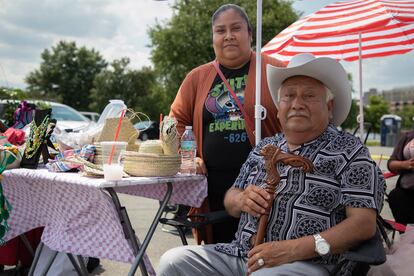
Marco Castillo — president of the board of directors of the Transnational Peoples Network — tells EL PAÍS that it’s “complicated” to request B1-B2 tourist or business visas at the different offices of the U.S. embassy in Mexico. “This time, the appointments took a long time — they’ve been requested since last year. We requested about 20, and we only managed to get five. The others will be [available] in 2025 or 2026,” he says.
According to Castillo — when it comes to Indigenous Mexican citizens — the rejection rates for appointments at the U.S. Embassy are “very high.”
“There’s a lot of discrimination in the criteria for visas,” he continues. “So, the battle of this organization has been to break down that wall of discrimination. And that’s why we started with the festival 10 years ago, because we have the idea that people from Indigenous origins [may not] have [substantial financial resources]. But they do have a background and cultural wealth to share. We’re constantly fighting against the racism of the Embassy. It’s a battle that’s been at the center of our struggle for many years.”
In 2023, the United States embassies and consulates in Mexico granted 2.3 million visas, an increase of 35% over those issued the previous year. The criteria for granting them vary greatly. The Network chooses people who work in or serve their communities and who have guarantees of return, so that the rejection of potential migrants is lessened. In previous years, they’ve been able to transport about 20 to 30 people to the U.S., so that they may be reunited with their relatives. Others are denied visas, such as Alonso’s wife (Edith’s mother). No reason was given as to why her application was rejected.
In New York City, there are numerous other organizations with programs aimed at reuniting families. Mi Casa Es Puebla, Casa Tlaxcala, or the Club Migrante Chinelos de Morelos are some of the NGOs that have benefited thousands of families and have facilitated their reunions. There are also programs that work out of different states in Mexico. However, according to public complaints, some of these groups lack transparency and charge families up to $10,000 to guarantee family reunification.
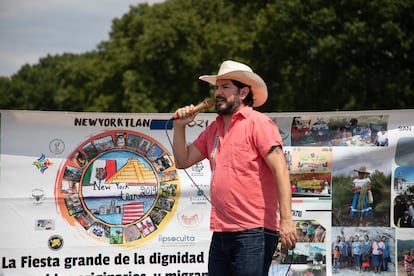
“I’m more nervous about immigration”
On Sunday afternoon, Antonia Tlache also arrives. She hasn’t seen her husband for more than 15 years. Fidel Cuapio picks her up at JFK and then takes her to a Mexican rap concert. He also plans to take her to the Statue of Liberty, which he’s sure she’ll love. He wants to show her the stainless steel Unisphere in Flushing Meadows-Corona Park and the 7,100-pound bronze Charging Bull on Wall Street.
Not a day has passed and they’ve already started looking at photos from when they began hanging out together, about 20 years ago, when “we were just kids,” Fidel smiles. Antonia, 37, insists that she’s changed a lot, that she isn’t the same as before. When she says this, she smiles shyly, as if she didn’t meet her husband two decades ago. It’s almost as if they’re having their first date today. Fidel tells her that she’s the same “beautiful woman” he met years ago.
“Honestly, it was very emotional to see her,” he tells EL PAÍS. “I spent many years alone here… it wasn’t easy at all. To be honest, time has passed, but the connection is the same. I think even more so.”
Esther Montalvo also arrives in New York for a family reunification. She’s tired when she gets off the plane. It was her first time flying: she felt dizzy for almost the entire trip. In reality, she still cannot believe this is all happening. “I never thought they would give me the visa. A year ago I tried and nothing,” she shrugs.
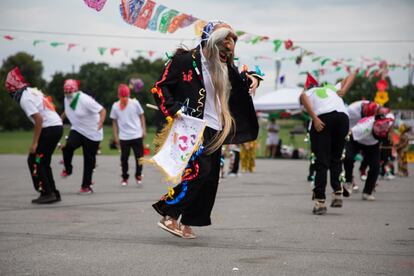
She isn’t nervous about seeing her husband. One day, he told her that he was going to the United States to work for three years. Twenty years have passed since then.
Montalvo also isn’t nervous about seeing her son, who crossed the border five years ago. What has really been on her mind since she left Malinaltepec, in the state of Guerrero, isn’t the nervousness of seeing them. Rather, it’s the fear that someone — an immigration officer — will deny her the moment to hug them.
“I’m more nervous about immigration, that they’re going to send me back,” Esther laments, even though she’s already outside the airport, where it seems that this possibility has vanished. But who can take away this fear from Esther, which has been instilled in people like her for years? She can’t wait to lie down and rest.
Translated by Avik Jain Chatlani.
Sign up for our weekly newsletter to get more English-language news coverage from EL PAÍS USA Edition
Tu suscripción se está usando en otro dispositivo
¿Quieres añadir otro usuario a tu suscripción?
Si continúas leyendo en este dispositivo, no se podrá leer en el otro.
FlechaTu suscripción se está usando en otro dispositivo y solo puedes acceder a EL PAÍS desde un dispositivo a la vez.
Si quieres compartir tu cuenta, cambia tu suscripción a la modalidad Premium, así podrás añadir otro usuario. Cada uno accederá con su propia cuenta de email, lo que os permitirá personalizar vuestra experiencia en EL PAÍS.
¿Tienes una suscripción de empresa? Accede aquí para contratar más cuentas.
En el caso de no saber quién está usando tu cuenta, te recomendamos cambiar tu contraseña aquí.
Si decides continuar compartiendo tu cuenta, este mensaje se mostrará en tu dispositivo y en el de la otra persona que está usando tu cuenta de forma indefinida, afectando a tu experiencia de lectura. Puedes consultar aquí los términos y condiciones de la suscripción digital.








































